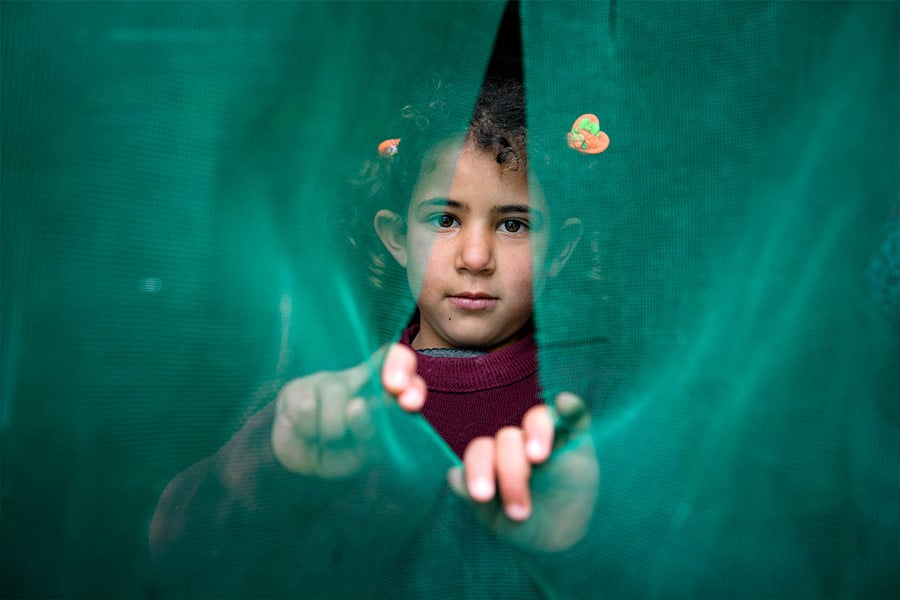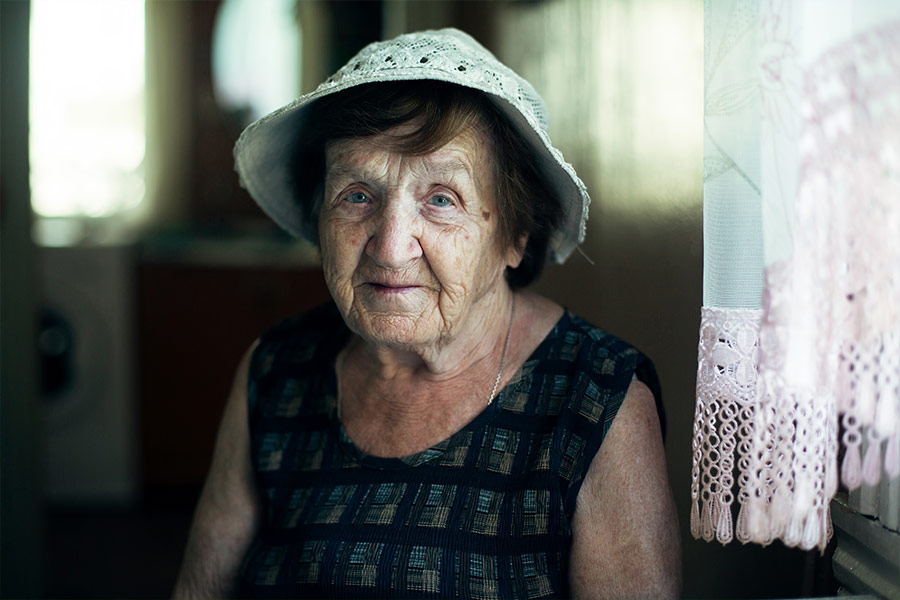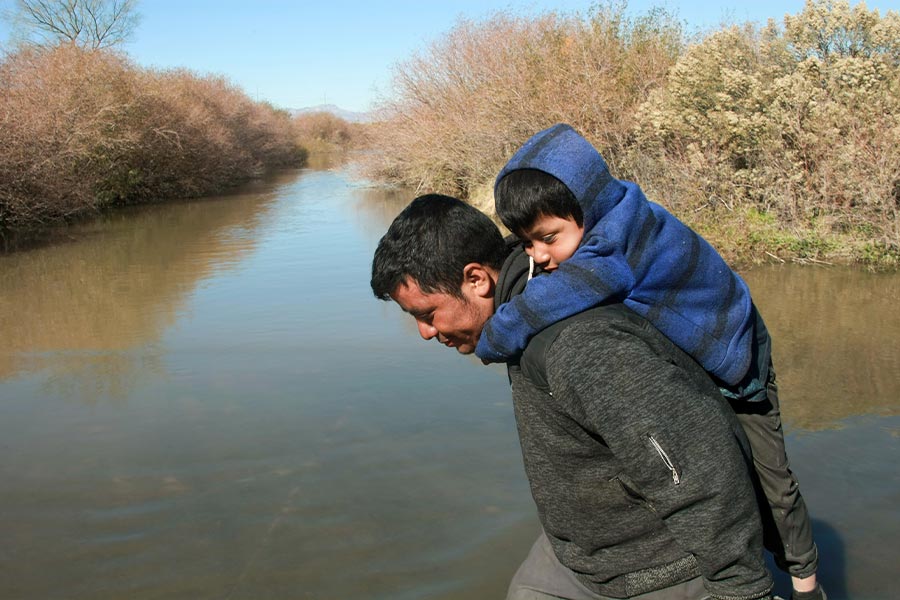Called to see clearly: seeing our neighbors with empathy and love

A Syrian girl at Zaatari refugee camp in Jordan. (Shutterstock/Richard Juilliart)
Sometimes problems are so big, we are paralyzed into inaction.
The battle over the protection of the unborn. Mass shootings. Racism. The demonization of immigrants. The vitriol in our political system.
What can I do that would make a difference in the vast swell of man’s inhumanity to man?
As an individual, our personal behavior appears immaterial on a national or global level. But step back into our personal circle of influence. Can we have an impact in our homes, on our street, or in our neighborhood? Could followers of Christ collectively rehumanize society?
Just as the societal problems exacerbated by a divisive culture are too immense for an individual to solve, neither can they be thoroughly analyzed in one article. But as a people called to love and respect each other as fellow image-bearers of God, we’ve got to make a start. We’ve got to rehumanize in order to see people clearly, not as the “faceless” other.
The battleground
When it comes to culture wars and polarization, we should look back. Way back to the Acts of the Apostles, according to Father Zachary Burns, TOR, parochial vicar of Good Shepherd Parish in Colleyville.
The early Christians didn’t waver from preaching the truth, but neither did they go out looking for a fight. “This was never the goal of the original followers of Christ — to go out and stir up trouble. All they wanted to do was share the truth because they believed in the freedom that truth offers,” Fr. Burns said.
Sometimes the message of the Risen Christ was welcomed and accepted, and at other times its messengers were beaten and imprisoned.
We can also expect a mixed response when we live truth and share the truth, but “by virtue of being a representative of Jesus, there’s going to be pushback against what we do, what we teach, and who we are,” according to Fr. Burns.
Like the followers of The Way, our goal is “not to instigate or win, just something we have to engage in by virtue of people who share the truth.”
Fr. Burns has observed that some voices in the public arena seek to bring Christians down to a certain level, but he said if we’re fighting in the mud, we’ve already lost. Resorting to sarcasm, name calling, scathing remarks, and other cheap tactics might be a temptation, but we want to bring dignity to the debate.
“Engage with others in charity. Always assume the best in people. We’ve set any interaction up for failure if you assume the worst of our opponent, or the person who thinks differently than us,” he recommended.
We shouldn’t be surprised if our message is not well received. Jesus predicted it, the Franciscan friar reminded. He told His Apostles at the Last Supper, “If the world hates you, realize that it hated me first” (John 15:18).
Divides are especially apparent in three public arenas: politics, traditional media, and social media.

Ultrasound illustration of baby in mother's womb. (Shutterstock/Alex Mit)
Polarizing Politics
The polarization in politics was first apparent in Washington, D.C., but it has filtered into state and local government — fighting has erupted even at local school board meetings.
Tan Parker, who represents District 63 in southwest Denton, has a front row seat in state politics, serving in the Texas House of Representatives since 2007.
“Certainly, there are lots of times when I have disagreements with fellow lawmakers as well as a disagreement with constituents. I think it is incumbent on me, as a lawmaker, to always be open to discourse. I think it’s very, very important that we always maintain civility in discourse and that we need to be able to agree to disagree without having lines that are drawn that don’t allow for future dialogue or conversation,” he said.
The lawmaker looks to Ronald Reagan as a model of finding common ground with those harboring a different viewpoint, and to Martin Luther King Jr. as an exemplar of nonviolent social change.
Rep. Parker said he employs patience and empathy as he listens to competing stances and reminds himself to seek the common good. “It’s important that we love our fellow man, that we do our best to have empathy for others, that we do our best to put ourselves in their shoes and understand topics from their vantage point,” he said.
Negative News
Media, whether television, radio, or newspaper, can be part of the solution or can exacerbate problems, according to Dave Palmer, executive director of KATH 910AM, the local affiliate of the Guadalupe Radio Network.
Unfortunately, the secular media, whether it’s conservative or liberal, likes to ignite controversy to attract eyeballs and ears, he said. If the audience is in a state of fear or agitation, viewers stay tuned, making disputes a purposeful strategy on many news and opinion programs to keep ratings high.
Palmer appreciates the alternative of Catholic media, which offers programming that upholds the teachings of the Catholic Church in an attractive manner that draws listeners in. “Not to say that everything is rosy and perfect, but at the same time, we want to leave people with a sense of hope,” he said.
Palmer cites call-in programs in Catholic media as models for respectful discourse, even during dissent. Callers may disagree with the teachings of the Church, but radio hosts respond in a knowledgeable, charitable, and disarming manner.
“Brilliant,” Palmer summarized.
To avoid becoming entrapped by the 24-hour news cycle of secular media that heightens fear or rage, make wise choices about the source, any potential biases, and the amount of media consumed.

Portrait of an old woman in the kitchen of her house. (Shutterstock/De Visu)
Social media
Social media can be positive. Family and friends who live across the country or across an ocean can share happy updates of births, first days of schools, and graduations. People with a common hobby can connect. Worthwhile causes often gain awareness and funds.
But one of the ills of social media is its capacity to teach us to amplify our moral outrage, because those responses get rewarded with more likes and shares.
A study from Yale University, published in the August 13 issue of Science Advances, provided evidence “that some people learn to express more outrage over time because they are rewarded by the basic design of social media.”
The relative anonymity of commenting and the amplification of moral outrage leads people to become “emotionally dysregulated online. Moral outrage, anger is a factor. We’re not as willing to keep our emotions in check, particularly online,” said Amy Fisher-Smith, Ph.D., the chair of the Department of Psychology at University of Dallas and a clinical psychologist.
Dr. Fisher-Smith recommended a more nuanced use of social media.
“Limit your time. Prolonged use is not helpful,” said the professor, who also stressed maintaining one’s critical thinking skills when engaging on social media.
Another suggestion to de-escalate conflict on social media comes from Bishop Robert Barron, a well-known online presence, who has stated he begins his responses with “Friend” to remind himself the anonymous person is not an adversary even if they have left a negative post.
Another common suggestion is to tuck a prayer card at the edge of the screen to note that Jesus is sitting next to you as you type your response.
Unseen or unimportant
We’ve lost our humanity in how we interact with each other in politics, the media, and online. Unfortunately, that’s not all.
We’ve lost our humanity by not seeing or caring about the other – whether because of a different skin color, economic status, age, religion, or culture.
Fr. Burns addressed this in his May 8 homily at Good Shepherd, which focused on the humanity of the unborn but addressed the dignity of all marginalized people.
“As Christians and as people of good will, we need to continue to rehumanize. Rehumanize. Remind people of the humanity of those they might be inclined to throw away. Not just babies, but the poor, the elderly, immigrants, the mentally ill,” he said.
Fr. Burns explained in an interview with the North Texas Catholic that Pope Francis terms this age as a “throwaway culture,” in which human life is not intrinsically worthy of protection, but instead human worth is measured in economic potential or a capacity for pleasure, achievements, or comfort.
The priest explained we, as a society, no longer comprehend the innate goodness, the worth of human life — our life and the lives of others.
We divide the world between “us” and “them,” with “them” being less equal, less worthy, less important.
“We’ve lost the sense of the dignity of life in relation to God and in relation to each other. What a sad place to be, when we’ve lost an understanding that we belong to God and we belong to each other,” said Fr. Burns.

A man and his son in Juarez. (Shutterstock/David Peinado Romero)
Positive connection
Despite our advances in technology, many people feel alone, isolated, unheard, unrecognized, or marginalized, according to Dr. Fisher-Smith, who added that philosophers and psychologists have been concerned for some time about the weakening of family and community structures.
“We have greater fragmentation, greater isolation. It’s a time where we see less ability to communicate effectively, less ability to listen, less ability to dialogue,” she said.
“Fostering real connectivity in our families and in our communities” needs to be a priority, said the professor.
The first place to build authentic connection, she suggested, is the kitchen table. Reinstate the family dinner with no cell phones.
“If it’s not dinner, create another family ritual without electronics that fosters some kind of communication between parents and children, dialogue between spouses,” she continued, adding that each family is unique.
Real connectivity begins in your family, and then expands to your community — starting with being involved in your church.
The U.D. professor said “churches are incredibly important” in creating connectivity in the community. Not only do you form relationships with fellow parishioners, but many parishes have outreach into their neighborhood.
In Pope Francis’ 2020 encyclical Fratelli Tutti (On Fraternity and Social Friendship), the pontiff speaks of a “culture of encounter, capable of transcending our differences and division... To speak of a ‘culture of encounter’ means that we, as a people, should be passionate about meeting others, seeking points of contact, building bridges, planning a project that includes everyone. This becomes an aspiration and a style of life” (215, 216).
Your life matters
We can choose not to add to the polarization of our culture, and in some small, simple ways, we can be a light to a society in darkness, one person at a time.
Encountering others, especially those from different backgrounds, “expands and deepens our understanding of our common humanity, that we’ve all been created by God. It’s an ongoing process,” said Sister Patricia Ridgley, SSMN.
The Sisters of St. Mary of Namur is an international religious order with provinces in nine countries, which helps the sisters grow in understanding of “the dignity of each person, no matter their financial, racial, or ethnic background,” Sr. Patricia explained.
“None of us can say we created ourselves. None of us can say, ‘I chose to be born in a more affluent community’ or ‘I chose to be born from a mother who was alone in the world.’ We receive in total giftedness who we are and where we come from.
Do we just not ponder that enough?” she asked.
She looks to Jesus as an example of embracing a culture of encounter, from talking with the woman at the well to eating dinner with tax collectors and sinners. Regardless of differences in culture, religion, and gender, He sought out others and treated them with deep respect.
At the Last Supper, Jesus said, “I give you a new commandment: love one another. As I have loved you, so you also should love one another” (John 13:34).
Love one another. Simple to comprehend, but difficult to execute. Nevertheless, as Catholic Christians, we must follow His command.
We can rehumanize ourselves and our culture, decrease division, and reach out to the marginalized when we encounter, listen, empathize, dialogue, and love.
